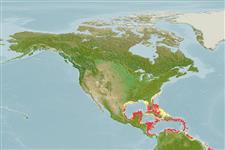Preferred temperature (Ref.
115969): 25.3 - 28.1, mean 27 (based on 180 cells).
Phylogenetic diversity index (Ref.
82804): PD
50 = 0.5000 [Uniqueness, from 0.5 = low to 2.0 = high].
Bayesian length-weight: a=0.00389 (0.00180 - 0.00842), b=3.12 (2.94 - 3.30), in cm Total Length, based on all LWR estimates for this body shape (Ref.
93245).
Trophic level (Ref.
69278): 3.6 ±0.6 se; based on diet studies.
Fishing Vulnerability (Ref.
59153): Low vulnerability (10 of 100).
